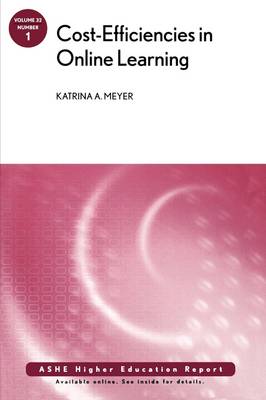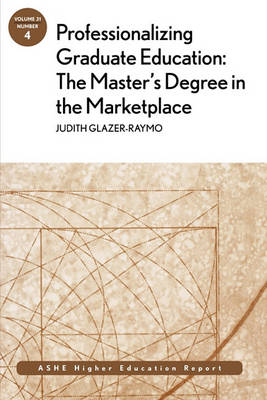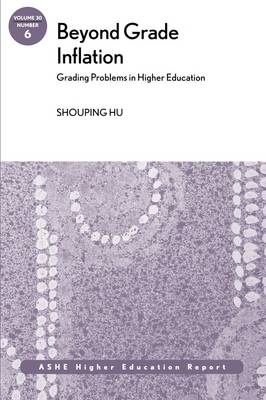ASHE Higher Education Report
3 primary works
Book 1
This report analyzes and summarizes the current literature about online learning's costs, using a framework developed by the author that helps disentangle cost influences across various research studies - for example, finding the intersection where research on students enlightens costs related to delivery. What do we know about achieving cost-efficiencies through online learning? Quite a bit, as it turns out, if you know how to interpret the data. Development is more expensive than delivery; development is where cost-efficiencies are made possible; delivery is where those cost-efficiencies occur; and infrastructure is a barrier, but also essential. This is volume 32, number 1, of the ASHE Higher Education Report.
Book 4
The master's degree demonstrates the diversity and complexity of graduate education in the twenty-first century. This study tracks its development and multiple trajectories in the context of a culture of professionalization and credentialism that now permeates every level of American society. Analyses of master's degrees in fourteen academic and professional disciplines and three interdisciplinary fields illustrate the changing landscape of graduate education. In building on her previous study of master's education, The Master's Degree: Tradition, Diversity, and Innovation (1986), the author identified initiatives that support continued innovation in master's education and that will continue to propel its pivotal role in the marketplace. She concludes her study with recommendations for extending the discourse on graduate and professional education, reframing questions about its principles and purposes, and addressing the consequences of transformation. This book will appeal to educators, employers, and policymakers who are concerned about the future of higher education in competitive, globalized environments.
This is the fourth issue the 31st volume of the Jossey-Bass series ASHE Higher Education Report. Each monograph in the series is the definitive analysis of a tough higher education problem, based on thorough research of pertinent literature and institutional experiences. Topics are identified by a national survey. Noted practitioners and scholars are then commissioned to write the reports, with experts providing critical reviews of each manuscript before publication.
This is the fourth issue the 31st volume of the Jossey-Bass series ASHE Higher Education Report. Each monograph in the series is the definitive analysis of a tough higher education problem, based on thorough research of pertinent literature and institutional experiences. Topics are identified by a national survey. Noted practitioners and scholars are then commissioned to write the reports, with experts providing critical reviews of each manuscript before publication.
Book 6
As calls for accountability of student learning intensify, colleges and universities need to reexamine their grading practices and restore public confidence in college grades. This report presents a conceptual framework that can aid in understanding the complexity of grading problems in higher education. It takes into account individual course-grading philosophy, students' choice of coursework, changes in composition of the faculty, and changes in the student population, among other factors. The conceptual framework helps professionals to understand that grading practices need to be examined at multiple levels, not just in the aggregate at the institutional and national levels. Practices and problems vary by discipline, institutional type, faculty rank, and other such conditions. The framework also provides advice about where policymakers and leaders can target efforts (state aid policy) and other areas where they can have little or no impact (student demographic shifts).
Capitalizing on the knowledge that senior faculty have related to grading, this monograph examines changing institutional practices, fluctuations in departmental and school norms, and various strategies for grading. It argues for the need for institutional policies related to grading and more discussion on campuses about standards and norms. The primary message of this monograph is that grading is a shared responsibility among members of the institution and external players such as accreditation bodies, state governments, and boards of trustees. Systematic work across these various groups is necessary to change the context that rewards lenient grading. This is Volume 30 Issue 6 of the "ASHE Higher Education Report" series, published by Jossey-Bass, An Imprint of Wiley.
Capitalizing on the knowledge that senior faculty have related to grading, this monograph examines changing institutional practices, fluctuations in departmental and school norms, and various strategies for grading. It argues for the need for institutional policies related to grading and more discussion on campuses about standards and norms. The primary message of this monograph is that grading is a shared responsibility among members of the institution and external players such as accreditation bodies, state governments, and boards of trustees. Systematic work across these various groups is necessary to change the context that rewards lenient grading. This is Volume 30 Issue 6 of the "ASHE Higher Education Report" series, published by Jossey-Bass, An Imprint of Wiley.


